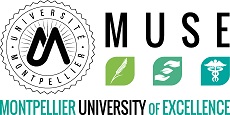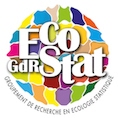Sunday, May 26
| 19:00 | Welcoming drink - Theatre de Verdure IGESA |
| 20:00 | Dinner |
Monday, May 27
| 09:00 | Welcome |
| 9:15-10:30 KEYNOTE |
D. DURAND - Genome Evolution |
| 10:30 | Coffee break |
| 11:00-12:00 3x 20 min TALKS (including questions) |
C. NOTREDAME - Fast and accurate large multiple sequence alignments using root-to-leave regressive computation J. CURY - Back to the future of bacterial population genomics K. GILBERT - Disentangling the complex interactions of background selection, associative overdominance, and recombination in determining genomic diversity |
| 12:00 | Lunch |
| 14:00-15:00 3x 20 min TALKS (including questions) |
N. DE MAIO - fast and accurate statistical evolutionary alignment E. KERDONCUFF - A fast genome chopper to detect strong species decline. J. VOZNICA - Deep Learning for Parameter Inference in Phylodynamics |
| 15:00-15:15 | Break |
| 15:15-16:30 KEYNOTE |
A. FRANCIS - The Mathematics of Phylogenetics Networks |
| 16:30-18:30 | freetime, beach |
| 18:30-20:00 POSTERS |
Wine and discussions (posters 1 to 10) |
| 20:00 | Dinner |
Tuesday, May 28
| 09:15-10:30 KEYNOTE |
M. BLUM - Genome wide association studies and polygenic models |
| 10:30 | Coffee break |
| 11:00-12:20 4x 20 min TALKS (including questions) |
S. LAMBERT - Estimating diversification rates from phylogenies when the total number of taxa is unknown L. JERMIIN - Detection of tree-likeness in phylogenetic data S. DUCHENE - Infectious disease phylodynamics using genomic and notification data H. RINGBAUER - Inferring runs of homozygosity from low coverage ancient DNA data |
| 12:20 | Lunch |
| 14:00-20:00 | Free afternoon (beach, hiking, theorems, etc.) |
| 20:00 | Dinner |
Wednesday, May 29
| 09:15-10:30 KEYNOTE |
L. EME - Phylogenomics for the origin and early evolution of eukaryotes |
| 10:30 | Coffee break |
| 11:00-12:00 3x 20 min TALKS (including questions) |
M. MANCEAU - Inferring the ancestral population size under birth-death models M. NAVASCUES - Joint Inference of Demography and Selection from Genomic Temporal Data Using Approximate Bayesian Computation V. BOSKOVA - Phylodynamic inference from large datasets with many duplicate sequences |
| 12:00 | Lunch |
| 14:00-15:00 3x 20 min TALKS (including questions) |
C. KOSIOL - IQ-TREE-POMO: Polymorphism-aware tree estimation Y. WONG - Inferring the ancestry of everyone J. MITCHELL - Testing n-Taxon Species Trees with the Multispecies Coalescent Model |
| 15:00-15:15 | Break |
| 15:15-16:30 KEYNOTE |
O. DELANEAU - Haplotype estimation with sub-linear complexity |
| 16:30-18:30 | Freetime, beach |
| 18:30-20:00 POSTERS |
Wine and discussions (posters 11 to 22) |
| 20:00 | Dinner |
Thursday, May 30
| 09:15-10:30 3x 20 min TALKS (including questions) |
D. WEGHORN - Probabilistic approaches to positive and negative selection inference on coding regions in cancer M. ALAMIL - A statistical learning approach to infer transmissions of infectious diseases from deep sequencing data C. CHAUVE - MLST genotyping of bacterial pathogens using whole-genome sequencing data |
| 10:30 | Coffee break |
| 11:00-12:15 KEYNOTE |
G. SELLA - Advances in Population Genetics |
| 12:15 | Lunch and farewell session |
| 14:00 | First ferry to La Tour Fondue |
Proposed Posters
> Poster 1 : Reconstructing paralogues phylogenies using a concatenation approach
Baltzis Athanasios (Centre For Genomic Regulation, FR)
> Poster 2 : When accuracy is of essence: The importance of sufficiently informative inference approaches for bridging the gap to conservation genetic applications
Buschbom Jutta (Ahrensburg, Germany, DE)
> Poster 3 : Genome-wide associations in multiple bat species
Harazim Marketa (Institute Of Vertebrate Biology, Czech Academy Of Sciences, Brno, Czech Republic, CZ)
> Poster 4 : General Purpose MCMC for Markov jump process estimation
Nguyen-Van-Yen Benjamin (Institut Pasteur - IBENS, FR)
> Poster 5 : Detecting Selection from Genomic Time Series with an Efficient Continuous Approximation of the Wright-Fisher Process
Paris Cyriel (INRA, FR)
> Poster 6 : [Poster] Weighted Genome Rearrangements
Simonaitis Pijus (LIRMM, FR)
> Poster 7 : PastML: Fast inference and visualization of ancestral scenarios
ZHUKOVA Anna (Pasteur Institute, FR)
> Poster 8 : NGPhylogeny.fr: New Generation Phylogenetic Services for Non-Specialists
Lemoine Frédéric (Institut Pasteur, FR)
> Poster 9 : Origin and evolution of polycyclic-triterpenes synthesis
Santana Molina Carlos (Centro Andaluz De Biología Del Desarrollo (CABD), ES)
> Poster 10 : Inférences démographiques et historiques à partir de données génomiques sous des modèles spatialisés réalistes : vers une prise en compte du paysage
Virgoulay Thimothée (CBGP, FR)
> Poster 11 : Introducing SNIF: An inferential framework for structured demographic inference
Arredondo Armando (INSA, FR)
> Poster 12 : Studying 3D genome evolution using genomic sequence
Mourad Raphael (Université Paul Sabatier, FR)
> Poster 13 : Revealing Convergent Substitutions without knowledge of phenotype
Morel Marie (Institut Pasteur, FR)
> Poster 14 : morFeus and beyond: searching orthologs in the twilight zone of sequence similarity in low and high throughput
Habermann Bianca (Aix-Marseille University, CNRS, IBDM UMR7288, Marseille, France, FR)
> Poster 15 : Incomplete genome annotation vs. missing function: The case of plant Antimicrobial Peptides.
Nosenko Tetyana (Research Unit Environmental Simulations, Helmholtz Centre Of Munich, DE)
> Poster 16 : Systematic use of structural information to exclude low reliability sequences in large-scale multiple sequence alignments
Mansouri Leila (Centre For Genomic Regulation (CRG), Barcelona, Spain, )
> Poster 17 : The Non Stationary Structured Coalescent (NSSC): modeling demographic changes on structured populations
RODRIGUEZ Willy (Institut De Mathématiques De Toulouse, FR)
> Poster 18 : Polymorphism-aware phylogenetic models provide a consistent estimator of the species tree
Borges Rui (Vetmeduni Vienna, AT)
> Poster 19 : An approach to reconstruct haplotypes from pool sequencing data
Futschik Andreas (Johannes Kepler University Linz , AT)
> Poster 20 : Experimental evolution with haplotype data: How and why to reconstruct haplotypes from pool sequencing data
Pelizzola Marta (Institut Für Populationsgenetik, Veterinary Medicine University, Vienna, Austria And Vienna Graduate School Of Population Genetics, Veterinary Medicine University, Vienna, Austria, AT)
> Poster 21 : Site-based studies of biodiversity to assemble the Tree-of-Life
Vogler Alfried (Imperial College London, UK)
> Poster 22 : Machine learning approaches to detect resistances in HIV
Blassel Luc (Unité Bioinformatique Evolutive, Institut Pasteur, FR)
| This site is managed by Martine Hornby - Legal information |










